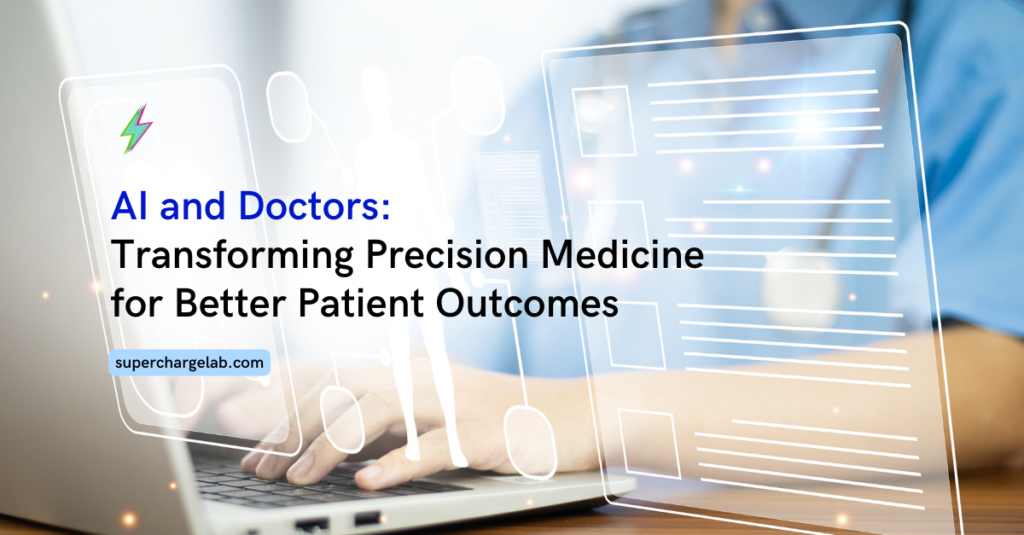
Tired of one-size-fits-all medicine? Precision medicine, powered by AI, is giving patients a voice and doctors the tools to deliver truly personalized care that can change lives. AI is making this a reality, transforming how we approach medicine. Here’s what you need to know about AI in healthtech.
1. The Dawn of Precision Medicine
Medicine has traditionally followed a one-size-fits-all approach, treating diseases based on broad categories and averages. However, precision medicine is shifting this paradigm by recognizing the individuality of each patient. It acknowledges that each person’s genetic variations, environmental influences, and lifestyle choices play a significant role in their health and susceptibility to various diseases.
This personalized approach holds huge potential for improved patient outcomes. Precision medicine offers a personalized approach to healthcare, optimizing disease prevention, early diagnosis, and treatment outcomes. This approach considers each person’s unique genetic makeup, lifestyle, and environmental factors. Take, for example, a patient with a genetic predisposition to a particular type of cancer. In this case, precision medicine would enable targeted screenings and interventions, potentially preventing the disease entirely or catching it at an early stage, leading to better treatment outcomes. Similarly, understanding a patient’s genetic makeup can help doctors select medications that are more likely to be effective and have fewer side effects.
2. AI as the Diagnostic Detective
AI is playing a pivotal role in the evolution of precision medicine, particularly in diagnostics. AI-powered algorithms, trained on vast datasets of medical images and patient data, can analyze this information with remarkable speed and accuracy. In medical imaging, AI can detect subtle signs of disease in X-rays, CT scans, and MRIs that might be missed by the human eye. This can be particularly valuable in detecting early-stage cancers, where early intervention is crucial for successful treatment.
Beyond image analysis, AI algorithms can sift through massive amounts of patient data, including electronic health records, genetic information, and lifestyle data. AI can analyze vast amounts of medical data to uncover hidden patterns and correlations, enabling early disease detection and risk prediction, leading to more effective interventions when treatment is most successful. For example, AI can analyze a patient’s medical history, family history, and lifestyle factors to assess their risk of developing heart disease or diabetes, allowing for proactive interventions and lifestyle modifications.
3. Your Treatment, Tailor-Made
One of the most exciting aspects of precision medicine is the ability to personalize treatments. AI algorithms can analyze a patient’s genetic profile, medical history, and other relevant factors to determine the most effective medications and therapies. This approach is already showing promise in the treatment of cancer, where AI can help identify the most effective chemotherapy drugs or immunotherapy options for a particular patient’s tumor. In rare diseases, AI can help match patients with clinical trials that are most likely to benefit them, potentially leading to new treatment breakthroughs. For chronic conditions like diabetes, AI can personalize insulin dosing regimens and lifestyle recommendations based on a patient’s specific needs and responses.
4. Doctors and AI: A Powerful Partnership
It’s crucial to understand that AI is not here to replace doctors but to empower them. AI tools can streamline administrative tasks, freeing up doctors to focus on patient care. For example ambient voice AI (ambient clinical listening)can transcribe patient-doctor conversations, generate summaries, and even pre-fill prescriptions, saving doctors valuable time. AI-powered decision support tools can provide doctors with evidence-based recommendations for diagnosis and treatment, helping them make more informed decisions. The collaboration between doctors and AI creates a powerful synergy, combining medical expertise with the analytical capabilities of artificial intelligence to enhance patient care. Doctors can use AI insights to make more accurate diagnoses, develop personalized treatment plans, and monitor patients more effectively.
5. Addressing the Challenges
The integration of AI into healthcare is not without its challenges. Data privacy is a major concern, as the collection and analysis of sensitive health data raise ethical and security issues. Stringent data protection measures, including anonymization and encryption, are essential to safeguard patient privacy. Algorithmic bias, where AI models may inadvertently discriminate against certain groups of patients due to biased training data, is another critical challenge. Ensuring that AI algorithms are trained on diverse and representative datasets is crucial to mitigate bias and ensure fairness in healthcare delivery.
Equitable access to AI-powered healthcare is crucial to prevent technology from widening existing health disparities. Efforts to bridge the digital divide, such as increasing access to broadband internet and affordable devices, are necessary to ensure that everyone can benefit from AI-powered healthcare advancements.
6. A Healthier Future with AI
The future of healthcare is bright, thanks to the transformative power of AI. As AI technology continues to advance, we can expect even more personalized and effective treatments, earlier disease detection, and a shift towards proactive rather than reactive healthcare. AI-powered tools will become increasingly integrated into clinical practice, empowering doctors to deliver the best possible care to their patients. With continued research, development, and ethical considerations, AI has the potential to revolutionize healthcare and usher in a healthier future for all.
If your organization is seeking innovative AI solutions to enhance your healthcare technology and improve patient outcomes, we invite you to contact us for a consultation https://calendly.com/superchargelab